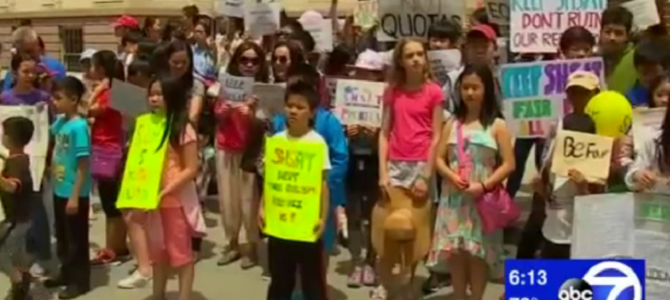
This week the Trump administration reversed an Obama-era policy that encouraged colleges to use race as a consideration in admissions. While the move itself is mostly symbolic, it coincides with the retirement of Supreme Court Justice Anthony Kennedy, who in 2016 was the swing vote in a case upholding the University of Texas’ race-based admissions policies.
In addition to these two developments, a New York City plan to use race as an element in admissions to elite public high schools that are now dominated by Asian students, and allegations that Harvard University is discriminating against Asian applicants, have woken a sleeping dragon. What has been known for some time but is now getting the attention it deserves is that affirmative action programs disproportionately harm Asians. In fact, they harm them far more than they harm whites.
Destroying the Historical Basis for Affirmative Action
Historically the basis and justification of race-based admissions was that white students benefited from centuries of racial injustice in myriad ways. As a result, affirmative action was meant to redress historical imbalances and level the playing field for minority students. But now that we see race-based admissions are disadvantaging Asians more than they are whites, this basis simply falls apart.
It is farcical to imagine that somehow centuries of systemic white supremacy are benefiting Asian students, many of who are first-generation Americans or even immigrants themselves. Moreover, there is no plausible way to suggest that these recent arrivals had any hand in creating the systems that disadvantage other minority groups.
None of this, however, stopped the Congressional Black Caucus from essentially calling the president a racist for his new policy. Its leader, Cedric Richmond, had this to say: “While I am not surprised, I continue to be disappointed that the president of this great country cares so little for its non-white residents and their interests.”
Unless we have suddenly decided that Asians are in fact white, this statement is absurd on its face. By far, the greatest beneficiaries of ending affirmative action would be non-white Asian students.
It’s Time For A New Justification
The Congressional Black Caucus, the Democratic National Committee, and many in the liberal media simply ignore the harm done to Asian students under this program. For a while, that worked. But now, Asian-American activists, Republicans, and the conservative media are shining a bright light on the issue that cannot be ignored. As a result, new justifications for race-based admissions that do not rely on unfair advantages bestowed upon whites must be created. So far, the results are not promising.
In the Washington Post, the newly woke Max Boot weighed in. He was once a conservative opponent of affirmative action who has in response to Trump become something very close to a progressive. To his credit, Boot frames the problem correctly. He is upfront about the fact that hard-working Asian kids are being thrown under the bus. Although he agonizes over it, ultimately he throws up his hands and says we have no choice. This is where he begins flailing for new answers.
The first ham-fisted answer he comes up with is that testing isn’t dispositive of future success in life. Sure. There is no perfect predictive model that colleges can use to determine who will or won’t go on to success. But what this has to do with affirmative action is unclear. After all, empirical data shows us that first-born children have greater measurable success than their younger siblings do. Should colleges therefore prefer first-born children?
The key component Boot is missing here is that whatever standards a college uses to determine who is likely to succeed should be equally and fairly applied to all applicants. In arguing that fewer Asians should be accepted because there is no guarantee they will be successful, he is opening the door a whole host of subjectively applied predictive models that could be used to advantage or disadvantage any group. But here in the real world, what this amounts to is “There are too many Asians in top schools.”
Diversity Is Its Own Reward
Boot’s second argument, and the one more likely to gain purchase on the Left, is that diversity in student bodies is its own reward. He writes: “You learn more about life if you go to class with people who are different from you — who have different abilities, different geographic origins, different social classes, different sexualities, different religions, different political views and, yes, different ethnicities. You don’t necessarily want a student body made up entirely of bookworms.”
First of all, it is far from clear why colleges, the entire purpose of which is to educate, wouldn’t want a student body entirely made of bookworms. But even if we accept that college has some social function served by exposure to all different kinds of people, it is important to understand that not all Asians are bookworms. Of the seven demographic boxes Boot creates here, Asians can check off all of them.
When we enact policies that knowingly and purposely disadvantage Asian applicants, we are harming disabled Asians, and geographically diverse Asians, poor Asians, gay Asians, and Marxist Asians. Boot would show all of these people the door simply because there are already too many people who look like them and do well on tests. In fact, that is exactly what Harvard is alleged to have done: giving Asian applicants intentionally lower scores on non-academic standards to produce fewer Asian students.
Democrats and progressives may continue trying to ignore the harm being done to Asian students, and pretend that it isn’t happening. After all, it destroys the entire narrative backing up their approach to affirmative action and diversity in schools. But their ability to hide this consequence from Asians themselves and the public at large is fast crumbling under the weight of reality.









